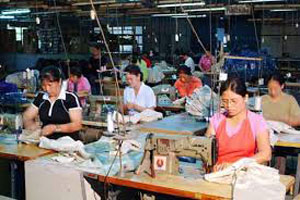
Lack of local textile avert PH from taking full benefits of EU zero tariffs
YarnsandFibers News Bureau 2015-02-05 10:00:00 – ManilaPhilippine’s inclusion in the EU’s GSP plus provides duty free entry to the EU for some of the most important Philippine exports, including and textiles has come as a gift but there are rules of origin for exports to enter duty free which is preventing the country from enjoying the expanded preferential treatment on exports to the European Union due to absence of local textile industry.
Department of Trade and Industry Undersecretary Rafaelita Aldaba said that the requirement is garments should have 60% local content, which the Philippines cannot comply with because it imports its textiles.
Philippines want the EU to waive this requirement as an incentive. Aldaba said that the Philippines will apply for a relaxation of the rules to allow the country to temporarily export to the EU duty-free, while it is building its own textile industry.
The EU removed tariffs on strategic Philippines exports in December 2014, granting the country's request for inclusion in the EU’s General System of Preferences plus (GSP+).
The costly power is preventing companies to invest in the textile industry, which has driven garment makers to rely on imports for their raw materials, inputs, and accessories.
Aldaba said that now that JG Summit is operating a naphtha facility which can provide the synthetic raw materials for textile. The textile industry can develop by making use of its products.
Aldaba referring to the multiple facilities of the Chinese firm Luenthai which makes garments and bags for many American brands. The aspiration is for the integration like what Luenthai has done. The undersecretary clarified that the country is not aiming to compete with mass-produced garments. Those are for Laos and Cambodia.
Bangladesh is also a contender, as its textile industry is a major foreign exchange earner and made the country the world’s leading ready-made garments (RMG) exporter, following China. In January, the Philippines and Bangladesh formed a business council, and the former is hopeful that with the renewed trade relations, particularly in the RMG and textiles, would be mutually beneficial for both countries in the long run.
Textiles and garments, footwear, headwear, umbrellas, and chemical products are among the product sectors that are most likely to benefit from the GSP+ scheme apart from this the GSP plus to also help create over 2,00,000 jobs in the manufacturing and agriculture sector in its early years of implementation.
Market Intelligence
Ask for free sample Report

experience
Customer Base
dedicated team
Countries Served Worldwide









